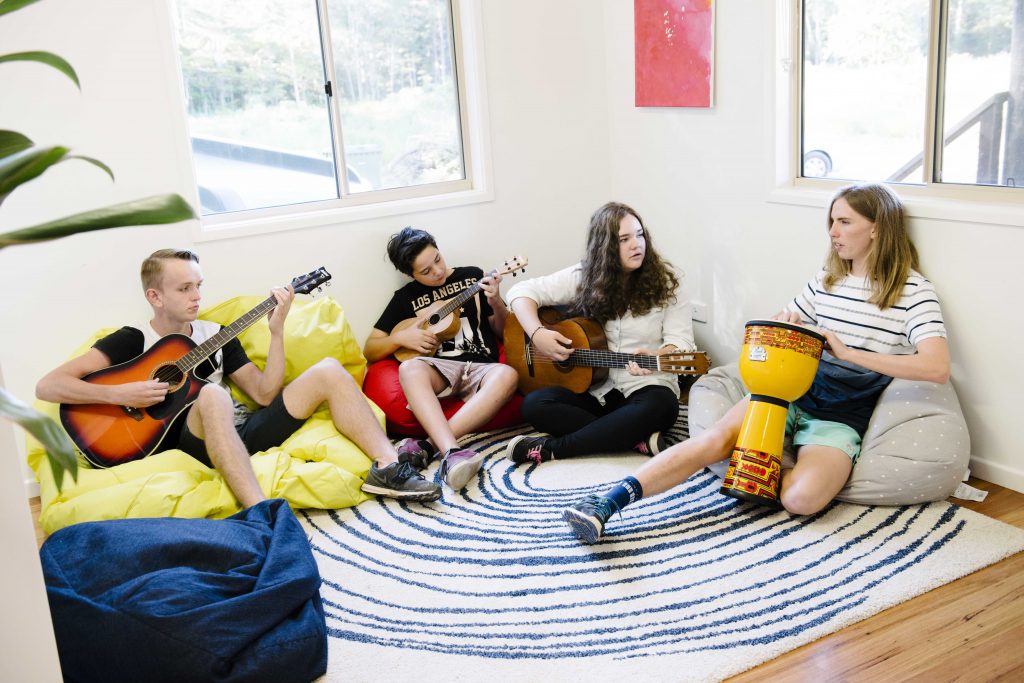Today’s blog is by MIC Parent Rachael Skyring. Rachael has three children at MIC – Tom in Senior Phase, Nick in the Adolescent Community and George in the Primary College…
I felt reluctant to write a post about parenting emerging young adults because I feel my children and my parenting style are not typical… but then I realised that was the entry point, especially for Montessori families. Don’t think for a second that I believe I have this whole gig sorted. I am still trying to learn and grow every day with the benefit and guidance of my live-in personal trainers.
1. Your child is an individual, not an average
This is always the Montessori starting point. Follow the child. Continue to trust their innate life intelligence and yours.
They will grow up in their own way, in their own time. They are developing along many fronts – physical, social, emotional, mental, sexual. Try to see your child for who they are now, today, which during the teenage years might be changing quickly.
2. Emotions are a thing
I listened in on a Montessori Toddler talk recently and smiled. The extreme emotional reactions of toddlers are not so different from those of teenagers. The next level of independence and personal power is being sought. Teenage bodies are much bigger and stronger. Emotions can feel overwhelming for everybody involved.
This period could be your biggest invitation to develop your own emotional intelligence if that’s an area which needs work, so you are better able to support your emerging adult.
Here’s my summary of the toddler parenting tips, which actually apply throughout life:
- Don’t take it personally. Breathe and recognise your own feelings.
- Acknowledge their feelings. Allow them time and space to process.
- Take the opportunity to connect. Avoid power plays as much as is humanly possible.
3. Give them some space
One of the distinguishing features of the Montessori educational philosophy is the open space and time built into the program. This space is an opportunity for children to tune into and follow their internal compass, directing their actions in alignment with their innate needs and desires. This space is a gift in the busy, noisy, tightly-scheduled modern world.
Teenagers who are rediscovering themselves and their place in the world definitely need this space too (as do their likely near middle-aged parents). Genuine down time is a necessity for growing bodies and minds. Slow time. Nature time. Daydreaming time. Sleep is also incredibly important.
The catch is the many time-sucking, insomnia-inducing traps laid for us all in our electronic devices. Social media and gaming to name names. It is tempting to schedule every minute of the day to avoid these pitfalls but this is not the solution either.
As parents, our challenge is to guide our children in navigating a path through these temptations. Modelling desirable work/life balance is always the most authentic and effective way of leading. It is definitely difficult to devote time to doing apparently nothing, but in the end it could be the most important time of all. Our children are not machines after all, they need space for inefficiency and not knowing.
4. Be curious, learn alongside them
Another Toddler talk touched on the idea of letting your children work alongside you, using real tools. With adolescents, the invitation is also to work alongside them, supporting them with a little guidance and benefit of experience. But let them find their own way and make their mistakes.
Just like the toddler, you are seeking to harness their enthusiasm, and try not to be too picky about results. That will come with practice and mastery, which requires sticking with it. Persistence is easier when the joy of the larger experience is maintained by letting the little things go.
Your curiosity about their experience will fuel theirs.
5. Be kind when you or they mess up
There will be awkward moments. You will both get it wrong. Too much freedom, not enough. Too much responsibility, not enough. Too much emotion, not enough. There will be yelling and tears.
Be real. Be honest. Be kind to yourself and them. Find ways to reopen lines of communication. Apologise where that is appropriate. Take responsibility for your own actions and triggers.
Remember you are all on the same team, and we need our team the most when we mess up. Guaranteed you will get many further opportunities to do it better, or at least differently.
6. You are not alone – connect with other parents
You will need all your wisdom and life skills to continue to nurture your young human as they grow up and ultimately away from you. Remember that you are not the first or the only person who has ever had to deal with the stuff that comes up. All the other kids have parents who are in the same boat. It’s ok to ask others to share their ideas and experiences. And laugh about it all. Our “problems” invite us to connect with others because a different perspective is often required to resolve them, or ease our mind, which is frequently the same thing. You don’t have to take advice unless it feels right to you for your situation. Expressing the question will very often suggest most of the answer you need. And make you friends.
Despite how it sometimes appears on the surface, your adolescent needs to feel your support and acknowledgement now as much as ever. Your role is less hands on, more communication and inspiration, which they will take forward with them into the world. Good luck, and may the force be with you.

MIC Parent, Rachael Skyring
Thank you for your wisdom and insight Rachael! We love hearing from MIC parents so if you’ve got something you’d like to share with the rest of the MIC community – get in touch. We’d love to hear from you!
